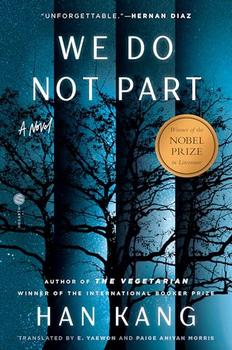Summary | Excerpt | Reviews | Beyond the Book | Readalikes | Genres & Themes | Author Bio

A Novel
by Han Kang1
Crystals
A sparse snow was falling. I stood on flat land that edged up a low hill. Along the brow of this hill and down its visible face to the seam of the plain, thousands of black tree trunks jutted from the earth. They varied in height, like a crowd of people ranging in age, and were about as thick as railway sleepers, though nowhere near as straight. Stooped and listing, they gave the impression of a thousand men, women, and haggard children huddling in the snow.
Was this a graveyard? I wondered. Are these gravestones?
I walked past the torsos—treetops lopped off, exposed cross sections stippled with snowflakes that resembled salt crystals; I passed the prostrating barrows behind them. My feet stilled as I noticed the sensation of water underfoot. That's strange, I thought. Within moments the water was up to my ankles. I looked back. What I saw astonished me: the far horizon turned out to be the shoreline. And the sea was crashing in.
The words tumbled from my lips: Who would bury people in such a place?
The current was strong. Had the tide surged in and out like this each day? Were the lower mounds hollowed out, the bones long since swept away?
There was no time. The graves already underwater were out of reach, but the remains higher up the slope, I needed to move them to safety. Now, before the sea encroached further. But how? There was no one around. I had no shovel. How would I get to them all? At a loss, I ran through the thicket of black trees, knees cleaving the rising water.
When I opened my eyes, the day had yet to break. The snowy field, the black torsos, the flood tide were gone; the only thing that met my stare was the window of my darkened room. I shut my eyes. Another dream about G—, it had to be. At this thought, I covered my lids with the cold palm of my hand and lay there unmoving.
The dream had come to me in the summer of 2014, a couple of months after the publication of my book about the massacre in G—. Over the next four years, it had never occurred to me to question the dream's connection to that city. But this summer I began to wonder if there might be something more to it. If my quick, intuitive conclusion had either been in error or an oversimplification.
The sweltering night heat hadn't let up for three weeks. Once again, I was lying under the broken air conditioner in my sitting room, hoping for sleep. I'd already taken several cold showers, but though I lay on the bare floor, my sweat-drenched body wouldn't cool. Finally, around five in the morning, the temperature began to drop. It was to be a brief grace, as the sun would be up in another half hour. But I felt I might sleep at last, and had in fact nearly drifted off, when the plain rolled in beneath my closed lids: snow scattering over rows of black timber; glimmering snowflakes studding the severed torsos like salt; all of it before my eyes, as vivid as day.
I don't know what set it off, the shaking. My body seemed to be racked by sobs, though my eyes remained dry. Was this terror? Or anxiety, agitation, perhaps an abrupt anguish? No, it was a bone-chilling awareness. That a giant, invisible knife—the weight of its heavy blade beyond any human capacity to wield it—hung in the air, with me as its target. As I lay pinned and staring.
The black-blue sea billowing in to dredge the bones away from beneath the mounds—it occurred to me for the first time that this might not be an allusion to the massacred people and the decades that followed. It could simply be a personal omen. Yes, perhaps that landscape of flooded graves and silent headstones was an intimation brought forward in time, a sign of what remained of my life to come.
This very moment, in other words.
In the four years between the first time I had the dream and that early summer morning, I had parted ways with several people in my life. Some of these partings had been by choice, while others had caught me entirely unawares; I'd fought the latter with everything I had. If, as various ancient faiths say, there exists in a celestial realm or a netherworld an immense mirror that observes and logs everyone's movements, I'm sure the last three to four years of my life as recorded there must resemble a snail coming out of its shell to push along a knife's edge. A body desiring to live. A body pricked and nicked. A body spurning, embracing, clinging. A body kneeling. A body entreating. A body seeping blood or pus or tears.
Excerpted from We Do Not Part by Han Kang. Copyright © 2025 by Han Kang. Excerpted by permission of Hogarth Books. All rights reserved. No part of this excerpt may be reproduced or reprinted without permission in writing from the publisher.
People who bite the hand that feeds them usually lick the boot that kicks them
Click Here to find out who said this, as well as discovering other famous literary quotes!
Your guide toexceptional books
BookBrowse seeks out and recommends the best in contemporary fiction and nonfiction—books that not only engage and entertain but also deepen our understanding of ourselves and the world around us.